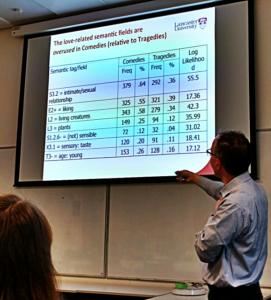Jules Horne, a playwright and attendee of the Lancaster Summer Schools in Corpus Linguistics and other Digital Methods reflects on her visit, and discusses the importance of the Encyclopaedia and Shakespeare’s Language project…
Ever wondered about Shakespeare as a writer? What techniques did he use? How did he create his effects? What can you learn for your own writing? As a playwright, I’ve always been curious, and was hugely excited to get the chance to go to Lancaster University’s amazing Summer School in Corpus Linguistics, and find out about research going on into Shakespeare’s use of language.

Analysing Shakespeare’s metaphors – Professor Jonathan Culpeper
Imagine forensic detectives sifting through Shakespeare’s words for clues – that’s essentially what the Shakespeare’s Language team under Professor Jonathan Culpeper are up to. Their forthcoming Shakespeare Encyclopedia is set to change the way we think about the beloved bard, thanks to new insights from deep computer analysis of his language.
There are lots of myths surrounding Shakespeare, and Prof Culpeper successfully debunked a few of them. Was Shakespeare’s vocabulary exceptionally huge? Not really – he just wrote more plays, and had a long life to do it in! Using the Shakespeare corpus (aka digitised body of text) alongside other writing from the period, the Lancaster team have analysed the playwright’s vocabulary diversity, and shown that he was no more eloquent than many other writers.
